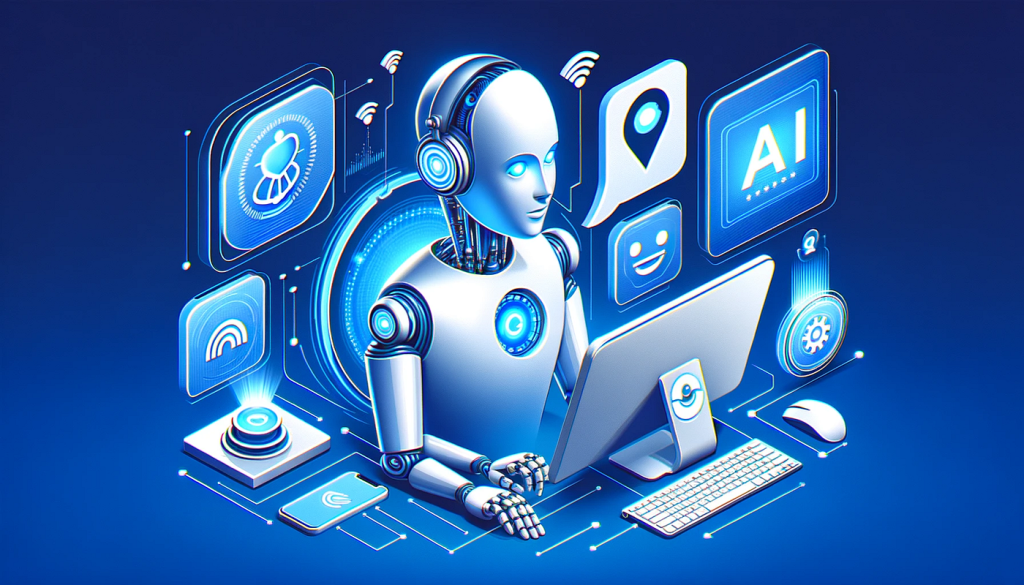The Future of AI-Powered Customer Support
Aiden Foster August 20, 2025
In 2025, AI-powered customer support is no longer a futuristic concept—it has become a critical component of modern business operations. Organizations across industries are leveraging artificial intelligence (AI) to enhance customer experiences, streamline operations, and drive growth. From automating repetitive tasks to offering personalized guidance, AI is reshaping how companies interact with their customers.
This article explores the current landscape of AI in customer support, emerging trends, implementation challenges, practical best practices, and a forward-looking perspective on how businesses can maximize AI’s potential. With insights drawn from leading tech analysts, industry reports, and real-world case studies, this comprehensive guide offers businesses the knowledge they need to navigate the AI-powered customer support landscape effectively.

Understanding AI-Powered Customer Support
AI-powered customer support involves integrating artificial intelligence technologies—such as machine learning, natural language processing (NLP), predictive analytics, and generative AI—into customer service operations. These systems are designed to handle a variety of tasks, from answering basic queries to providing intelligent recommendations, enabling companies to deliver faster, more accurate, and highly personalized customer service.
Key Components of AI Customer Support
- Chatbots and Virtual Assistants
Chatbots are AI-driven tools that interact with customers through text or voice. They can respond instantly to frequently asked questions, guide users through troubleshooting processes, or provide information about products and services. Advanced virtual assistants can carry out multi-turn conversations, remembering context, and adapting responses based on user behavior. - Sentiment Analysis
AI systems use sentiment analysis to detect customer emotions during interactions. By analyzing language patterns, tone, and keywords, AI can identify frustration, satisfaction, or confusion, enabling timely intervention by human agents when needed. - Predictive Analytics
Predictive analytics leverages historical data to anticipate customer needs. For example, AI can suggest products, detect potential service issues before they arise, or recommend personalized solutions based on past interactions. - Automated Ticketing Systems
AI-powered ticketing systems categorize, prioritize, and route customer requests to the appropriate department or agent. This reduces response times and ensures that critical issues are addressed efficiently. - Knowledge Management
AI can continuously analyze and organize internal knowledge bases, ensuring that agents and customers have access to the most relevant information in real-time.
Emerging Trends in AI-Powered Customer Support
As AI technology evolves, several key trends are shaping the future of customer support.
1. Hyper-Personalization Through Predictive Analytics
Personalization has become a key differentiator in customer support. Customers expect experiences tailored to their preferences and history. Predictive analytics allows AI to anticipate customer needs, offering proactive support rather than reactive problem-solving.
Example: E-commerce platforms are using AI to monitor shopping behavior, offering real-time recommendations or preemptively addressing issues such as abandoned carts. This approach can significantly increase conversion rates and customer satisfaction.
2. Hybrid AI-Human Support Models
While AI can handle repetitive and routine inquiries efficiently, complex issues often require human judgment, empathy, and problem-solving skills. A hybrid model, where AI handles straightforward queries and human agents manage nuanced situations, ensures efficiency without sacrificing the human touch.
Case Study: A leading telecom company implemented a hybrid model, using AI to resolve 70% of routine inquiries while freeing human agents to handle high-value or emotionally sensitive cases. The result was a 40% improvement in overall customer satisfaction.
3. Voice AI and Conversational Interfaces
Voice recognition and NLP technologies have matured, enabling voice-powered customer support.
Example: Airlines are using AI-powered voice assistants to answer flight inquiries, manage bookings, and provide personalized travel updates. This reduces call wait times and enhances the customer experience.
4. AI-Driven Quality Assurance
AI is increasingly used to monitor and evaluate interactions between agents and customers. By analyzing conversation data in real-time, AI can identify mistakes, provide immediate feedback to agents, and maintain consistent service quality.
Benefit: Businesses can ensure uniformity in responses, reduce human error, and maintain high standards across multiple service channels.
5. Ethical Considerations and Transparency
As AI adoption grows, ethical concerns such as data privacy, algorithmic bias, and transparency are becoming more prominent. Organizations must implement AI systems responsibly, ensuring that customer data is protected and AI decisions can be explained clearly.
Key Point: Transparency fosters trust. When customers understand that AI is being used to improve their experience—not replace human judgment—they are more likely to engage positively.
6. AI for Multichannel and Omnichannel Support
Modern customers interact across multiple platforms, including websites, mobile apps, social media, and messaging apps. AI enables seamless integration across these channels, providing consistent support regardless of where a customer initiates contact.
Example: Retail companies integrate AI chatbots across Facebook Messenger, WhatsApp, and their website, ensuring customers receive the same information and personalized support wherever they interact.
7. Proactive Support and Issue Prevention
Predictive AI tools can detect patterns indicating potential issues before they affect the customer. For example, telecom providers can anticipate network outages, notify affected customers, and offer alternative solutions before complaints arise. This proactive approach reduces friction and builds loyalty.
Challenges in Implementing AI-Powered Customer Support
Despite its advantages, implementing AI in customer support comes with challenges:
1. Data Privacy and Security
AI systems rely on large volumes of data. Protecting this data against breaches and ensuring compliance with regulations like GDPR and CCPA is crucial.
2. Integration with Existing Systems
Legacy systems may not be compatible with AI tools. Businesses often face technical hurdles when integrating AI with existing CRM platforms, ticketing systems, and knowledge bases.
3. Customer Trust and Acceptance
Not all customers are comfortable interacting with AI. Lack of empathy or misinterpretation of inquiries can create frustration. Transparent communication and hybrid models help mitigate these concerns.
4. Continuous Learning and Maintenance
AI models require ongoing updates and training to adapt to changing customer expectations, new products, and emerging issues. Neglecting this can lead to outdated responses and diminished service quality.
5. Cost of Implementation
While AI can reduce long-term operational costs, the initial investment in software, infrastructure, and staff training can be significant, particularly for small businesses.
Best Practices for Leveraging AI in Customer Support
Businesses can optimize AI-powered customer support by following these best practices:
1. Define Clear Objectives
Set measurable goals, such as reducing average response times, increasing first-contact resolution rates, or improving customer satisfaction scores.
2. Select the Right AI Tools
Choose AI solutions that align with your business size, industry, and customer needs. Evaluate factors such as integration capabilities, scalability, and ease of use.
3. Maintain Human Oversight
Ensure human agents remain involved to handle complex or emotionally sensitive cases. Human-AI collaboration is essential for maintaining empathy and high-quality support.
4. Continuously Monitor and Optimize
Regularly assess AI performance using metrics such as response accuracy, customer satisfaction scores, and agent productivity. Adjust algorithms and update knowledge bases as needed.
5. Train Customers and Staff
Educate both customers and employees about AI support features. Clear guidance on how AI can help improves adoption and reduces confusion.
6. Prioritize Ethical AI Use
Implement transparency protocols, monitor for biases, and safeguard customer data. Ethical practices not only comply with regulations but also build long-term trust.
7. Leverage Data for Insights
AI generates valuable insights from customer interactions. Use these insights to refine products, identify recurring issues, and enhance service delivery.
Real-World Applications and Case Studies
Retail Industry
Retailers are using AI chatbots to assist with product recommendations, manage returns, and answer questions about stock availability. AI can predict trends, allowing retailers to tailor promotions to individual customer preferences.
Case Study: A global e-commerce retailer implemented an AI assistant across its website and mobile app. Within six months, the AI handled 65% of routine inquiries, improving response times by 50% and boosting customer retention.
Telecommunications
Telecom companies employ AI for network monitoring, predictive maintenance, and automated troubleshooting. AI identifies potential outages and guides customers through self-service solutions.
Case Study: A major telecom provider reduced call center traffic by 40% after deploying AI-powered self-service tools, allowing human agents to focus on complex technical issues.
Banking and Financial Services
Banks leverage AI to automate fraud detection, streamline customer onboarding, and provide 24/7 support through chatbots. AI improves response times and enhances security through real-time monitoring.
Case Study: A leading bank implemented AI chatbots for loan inquiries. Customer satisfaction improved by 30%, while loan processing times decreased by 25%.
Healthcare
Healthcare providers use AI to schedule appointments, provide information about treatments, and answer patient queries. AI reduces administrative workload and enhances patient engagement.
Case Study: A regional hospital deployed an AI virtual assistant to handle appointment scheduling and post-treatment follow-ups, increasing patient satisfaction and reducing administrative costs.
Future Outlook: 2025 and Beyond
As AI continues to evolve, customer support will become increasingly proactive, intelligent, and personalized. Emerging technologies such as generative AI and advanced NLP will enable systems to handle more complex queries, understand nuanced human language, and provide emotionally aware responses.
Key trends to watch include:
- AI-Augmented Agents: Agents supported by AI recommendations in real-time to improve efficiency and accuracy.
- Emotionally Intelligent AI: AI capable of detecting mood, tone, and sentiment to provide empathetic responses.
- Global AI Support Networks: AI systems capable of operating across languages and regions, offering consistent global service.
- AI-Driven Customer Insights: Advanced analytics from AI interactions to inform business strategy and product development.
Businesses that embrace these innovations while maintaining ethical, transparent, and human-centered support practices will have a competitive advantage in the coming years.
Conclusion
AI-powered customer support represents a fundamental shift in how businesses interact with their customers. By understanding emerging trends, addressing implementation challenges, and adopting best practices, organizations can harness AI to deliver exceptional experiences, reduce operational costs, and drive sustained growth.
The future of customer support is not AI replacing humans—it is AI enabling humans to provide better, faster, and more personalized service. Companies that invest in ethical, scalable, and intelligent AI solutions today are positioning themselves to meet the expectations of tomorrow’s customers.
References
- Zendesk. (2024, December 9). Customer service trends 2025: AI hype vs. customer trust. Available at: https://www.the-future-of-commerce.com (Accessed: 20 August 2025).
- IBM. (2025). The future of AI in customer service. Available at: https://www.ibm.com (Accessed: 20 August 2025).
- Cresta. (2025). The future of the contact center: AI predictions for 2025. Available at: https://cresta.com (Accessed: 20 August 2025).








